
Cinema of Colombia refers to film productions made in Colombia, or considered Colombian for other reasons. Colombian cinema, like any national cinema, is a historical process with industrial and artistic aspects.

La primera noche is a 2003 Colombian film, directed by Luis Alberto Restrepo. The film won 18 International awards and was Colombia's submission for the Academy Awards in the Best Foreign Language Film category in 2004. Even though the movie was highly acclaimed, after being released in some festivals throughout the United States, it never made it to big theaters. After 3 years of theatrical release, the film was released on DVD in the United States on January 30, 2007.

Simón Brand is a Colombian film director. Brand has directed more than 200 TV commercials for companies such as Coca-Cola, Coors Light, AT&T, Apple Inc., BMW. He has also directed music videos for artists such as Paulina Rubio, Thalía, Juanes, Shakira, Alejandro Fernández, Enrique Iglesias and Ricky Martin.
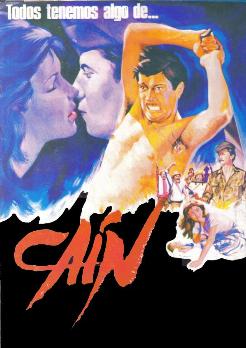
Caín is a 1984 Colombian drama film directed by Gustavo Nieto Roa. The film is based on the eponymous novel by Eduardo Caballero Calderón. The plot, told in retrospect, sets the biblical story of Cain and Abel in 1960s rural Colombia. It follows the bitter rivalry between two brothers over the love of one woman.

A la salida nos vemos is a 1986 Colombian drama film directed and co-written by Carlos Palau. The film is a teen drama set in a Catholic boarding school in rural Valle del Cauca in the 1960s.
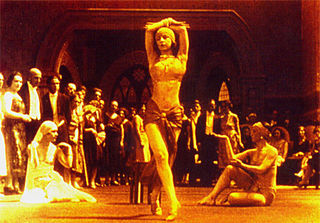
Garras de oro, also known as Alborada de justicia, is a 1927 Colombian silent film.

A Time to Die, also called Time to Die, is a 1985 Colombian drama film directed by Jorge Alí Triana and starring Gustavo Angarita, María Eugenia Dávila and Sebastián Ospina. The script, written by Colombia's Nobel Prize-winning author Gabriel García Márquez, had been shot twice before, first in 1965 by Mexican director, Arturo Ripstein and in 1982 also by Jorge Alí Triana as a TV series produced by RTI Producciones.
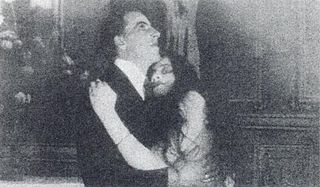
La tragedia del silencio is a Colombian silent melodrama film directed by Arturo Acevedo Vallarino and first screened on 18 July 1924 at the Faenza theatre in Bogotá. Filmed in black and white, it tells the story of a man suffering from leprosy. It was the first Colombian film during the silent film era with a film score, which was performed during the projection and was written by Alberto Urdaneta Forero.
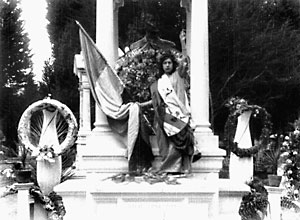
El drama del 15 de octubre is a lost Colombian silent film directed by the Di Domenico brothers. Considered the first feature documentary film produced in Colombia, it depicts events surrounding the assassination of General Rafael Uribe Uribe on 15 October 1914, including a reconstruction of the killing itself. It was first screened to the public on 21 November 1915 at Salón Olympia in Bogotá.
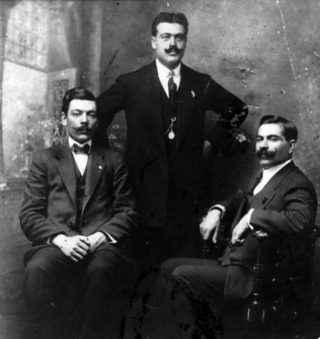
Francesco Di Domenico (1880–1966) and Vincenzo Di Domenico (1882–1955), known together as the Di Domenico brothers, were Italian film directors who played an important role in Colombian cinema.
Hugo Restrepo is a Colombian film producer, cultural critic, and writer, renowned for his significant contributions to Colombian cinema, mainly for his films, Addictions ,Subtractions (2004) ,and Que pase el aserrador (1984), mainly for the Neorealism movement. His work has left an enduring impact on the nation's modern intellectual and cultural landscape.
Darío Armando García Granados, better known as Dago García, is a screenwriter, film producer, director, editor and social communicator. He works currently as production vice-president of Colombian private television network Canal Caracol. He is one of Colombia's most well-known screenwriters.
Karen Lamassonne is a Colombian American artist. Throughout her career Lamassonne has explored a plethora of disciplines such as film, printmaking, painting, graphic design, video art, and music. Lamassonne’s work is notable for reflecting this combination of several different studies, most noticeably that of her paintings having a very cinematic vision behind them. Noteworthy works of Lamassonne’s all contain this sense of multifaceted technical skills put into them. A majority of Lamassonne's work contains motifs of sensuality from a woman's perspective, specifically she includes sexuality from her own perspectives and experiences. Moreover, her signature combination of feminine-led sexuality and a frank expression of true life have led to both Lamassonne and her work being the subject of criticism via censorship.
Colombia magia salvaje is a Colombian documentary film released in 2015, directed by Mike Slee and produced for Éxito Group, by the Ecoplanet Foundation and the British firm Off The Fence. The film is a sample of the biodiversity of Colombia, recorded in 85 different locations to achieve the portrait of 20 ecosystems.

El Amparo is a 2016 film directed by Rober Calzadilla and coproduced between Colombia and Venezuela. The film is set in El Amparo, a Venezuelan location on the shores of Arauca River, in the Colombian border, based in the 1988 Massacre of El Amparo, where the Venezuelan army killed several fishermen, accusing them of being Colombian guerillas.

Amparo is a 2021 Colombian drama film directed by Simón Mesa Soto and starring Sandra Melissa Torres, Diego Alejandro Tobón, Luciana Gallego, John Jairo Montoya and Adriana Vergara. Before arriving in Colombian theaters, the film participated in several international events like the Cannes, Chicago, Punta el Este and Lima film festivals, where it received awards and nominations.
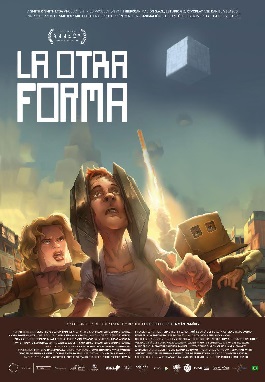
The Other Shape is a 2022 Colombian-Brazilian adult animated science fiction film written and directed by Diego Felipe Guzmán in his directorial debut. It won the award for best animated feature film at the Sitges Film Festival in 2022, and the same year received a nomination for the Contrachamp award at the Annecy International Animation Film Festival and the award for best feature film at the Chilemonos International Animation Festival. According to the newspaper El Colombiano, the film "used the frame-by-frame technique with more than 60,480 drawings or frames to achieve [its] story". It was commercially released on March 30, 2023 in Colombian theaters.
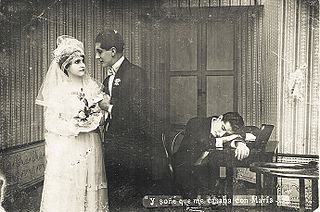
María is a 1922 Colombian silent film in black and white, directed by Máximo Calvo Olmedo and Alfredo del Diestro.

Línea de tiempo is a 2023 Colombian action thriller film written, directed and edited by Yesid Leone. It stars María Fernanda Yepes accompanied by Osvaldo León, Roberto Escobar, Adrián Díaz, Alexander Guzmán and Carlos Congote. It premiered on April 27, 2023, in Colombian theaters.















